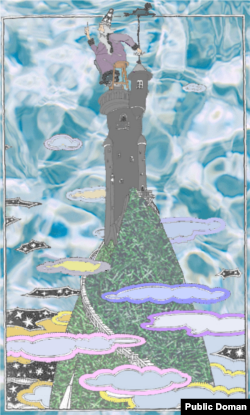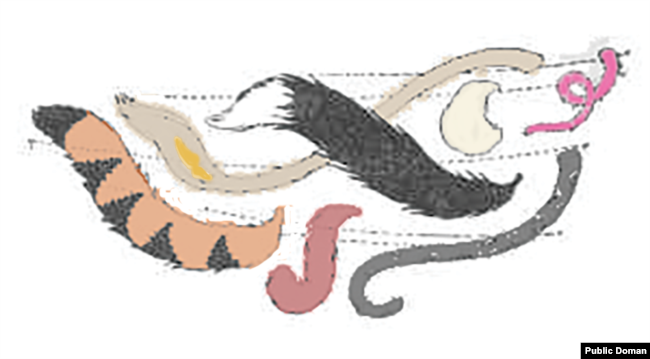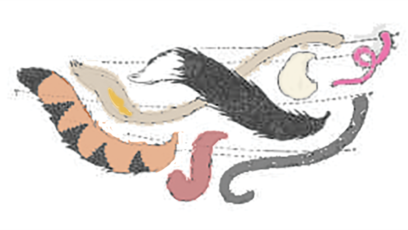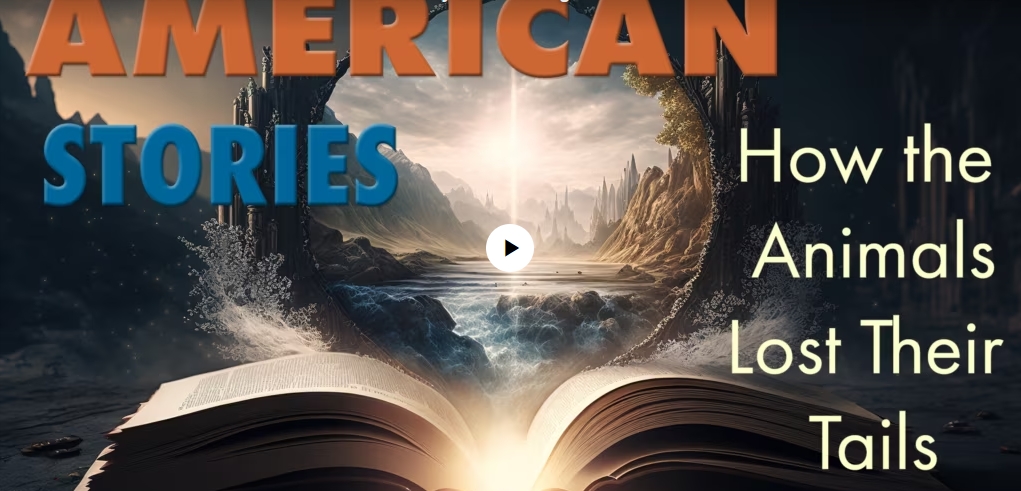Introduction:
Today’s story is How the Animals Lost Their Tails and Got Them Back Traveling from Philadelphia to Medicine Hat. It appeared in the book Rootabaga Stories by Carl Sandburg, published in 1922.
Sandburg was a very famous American poet. He wrote Rootabaga Stories for his three daughters Margaret, Janet and Helga. The stories make liberal use of repetition and nonsense language, a fun form of word play.
Listen closely to the language of this story about talking animals with a big problem.
________________________________________________
Far up in North America, near the Saskatchewan River in Winnipeg wheat country not far from the town of Moose Jaw, where nobody works unless they have to, and they nearly all have to, there is a place known as Medicine Hat.

There, on top of a high tower in a high chair, sits the Head Spotter of the Weather Makers.
When the animals lost their tails, it was because the Head Spotter got careless.
How all the animals lost their tails
You see, the tails of the animals were hard and dry because of a stretch of hot, dusty weather. Then, at last, came a rain. It poured down on the animals’ tails and softened them.
But then a cold wind came and froze all the tails solid. A big wind followed and blew and blew and blew until all the animals’ tails flew off their bodies.
It was easy for the hogs with their short tails. But it was not so easy for the blue fox, who uses his tail to run and to write secret letters in the snow.
It was easy for the rabbit and her little white tail. But it was hard for the yellow flongboo who lights up her home in the hollow tree with her bright tail.
The animals decided to choose a committee of representatives to represent them in parleyhoo to see what steps could be taken by talking to do something.
There were 66 representatives on the committee. They decided to call it the Committee of Sixty Six.
For a chairperson they picked the top flongboo. When there was a fight among the flongboo families, she was the one who would say who was right and who was wrong.
She was from Chappaquiddick and lived there in a horse chestnut tree between South Hadley and Northampton.
After her nomination and election, she brought the Committee of Sixty Six to order.
“It is no picnic to lose your tail and we are here for business,” she said banging the gavel.
The blue fox’s proposal
Then a blue fox from Waco, Texas stood up and said, “Madam Chairwoman, do I have the floor?”
That is a way of saying, “May I speak?”
“I make a motion,” said the blue fox.
“I move that this committee get on a train at Philadelphia and ride on the train until it stops and then take another train until we get to Medicine Hat where the Head Spotter of the Weather Makers sits. There, we will ask if he will bring back our tails.”
The Chairwoman said, “All in favor of the motion will clean their right ears with their right paws.”
And all the blue foxes and yellow flongboos began cleaning their right ears with their right paws.
“All who oppose the motion will clean their left ears with their left paws,” said the chairwoman.
And all the blue foxes and yellow flongboos began cleaning their left ears with their left paws.
“The motion is carried both ways, it’s a razzamatazz,” said the chairwoman.
“Once again, all in favor of the motion will stand up on their toes.”
And all the blue foxes and all the yellow flongboos stood up.
“And now,” said the chairwoman, “all who are against the motion will stand on the top of their heads, stick their hind legs up in the air, and make a noise like woof, woof.”
No one opposed the motion.
“The motion is carried,” said the chairwoman.
So the committee went to Philadelphia to get the train to Medicine Hat.
The Chairwoman asked a policeman there: “Would you be so kind as to tell us the way to the Union Depot.”
“It pays to be polite,” said the policeman.
“May I ask you again if you would kindly direct us to the Union Depot where the train is?” asked the flongboo again.
“Polite persons and angry persons are different kinds,” said the policeman.
The flongboo’s eyes changed their light, and a slow fire burned from where her tail used to be.
She said, “Sir, I must inform you that we are The Committee of Sixty Six. We are distinguished representatives from places you do not know. This committee is going to ride to Medicine Hat with a special message and a secret errand for the Head Spotter of the Weather Makers.”
“I am a polite friend of all respectable people,” said the policeman touching the star on his chest.
“This is the first time ever in the history of the United States that a committee of sixty-six has ever visited a city in the United States,” said the flongboo.
“I beg to be mistaken,” finished the policeman. “The Union Depot is under that clock.” And he pointed to a big clock nearby.
The train trip to Medicine Hat
Over to Union Depot train station they went, all sixty-six, half foxes, half flongboos.
“They are speaking in some strange language from where they come from,” said one passenger.
“They have secrets to keep among each other, and never tell us,” said another passenger.
“We will find out all about it in the newspapers tomorrow,” said a third passenger.
Then the foxes and flongboos climbed into a special car.
The train left the station. It came to the Horseshoe Curve near Altoona where the tracks bend in a half circle. Then it went on toward Ohio.
Two baby blue foxes, the youngest on the committee, sat at the front of the car.
Crossing Ohio and Indiana at night the flongboos took off the top of the car. The conductor told them, “I must have an explanation.” “It is between us and the stars,” they told him.
The train ran on to Chicago. There were pictures in the newspapers that afternoon showing foxes and flongboos eating pink ice cream with iron axes.
Each blue fox and yellow flongboo got their own newspaper.
Crossing to the north the sky began to fill with the snow ghosts of Minnesota. Again the foxes and flongboos lifted the top off the car so they would not miss the show.
Some went to sleep but the two baby blue foxes stayed up watching the snow ghosts and telling snow ghost stories to each other.
Early in the night the first baby blue fox said to the second, “Who are the snow ghosts the ghosts of?” The second baby blue fox answered, “Snow men, snow foxes and snow fishes, everybody has a snow ghost.”
And that was only the beginning of their talk. They would talk until morning about where the snow ghosts go on Christmas morning and how the snow ghosts watch the New Year.
Somewhere between Winnipeg and Moose Jaw, they stopped the train and all ran out in the snow. The white moon was shining down a valley of birch trees.
At last they came to Medicine Hat, near the Saskatchewan River in Winnipeg wheat country not far from the town of Moose Jaw, where nobody works unless they have to, and theynearly all have to.
There they ran to the place where the Head Spotter of the Weather Makers sits in a igh chair on a high tower watching the weather.

“Let loose another big wind to blow back our tails, let loose a big freeze to freeze our tails back on, and let us get back our lost tails,” they said to the Head Spotter.
Which was just what he did, giving them exactly what they wanted, so they all went back home satisfied.
Mario Ritter, Jr. adapted this public domain story by Carl Sandburg for VOA Learning English.
Quiz – How the Animals Lost Their Tails

Start the Quiz to find out
________________________________________________
Words in This Story
no picnic – idiom a difficult thing to do or an unpleasant experience
gavel – n. a small hammer that is used for getting attention in a court or a formal meeting of officials or lawmakers
have the floor – idiom have the right to speak at a public meeting
make a motion – idiom to formally propose something in a debate or formal proceedings
move – v. (formal) to propose that something be done
razzamatazz – n. noisy and excited activity meant to attract attention
hind legs – n. (pl.) the two back legs of a four-legged animal
polite – adj. showing good manners and respect for others
distinguished – adj. known by many people for some special quality or something done in the past
errand – n. a short trip aimed at getting something done
ax – n. a tool used for cutting wood
